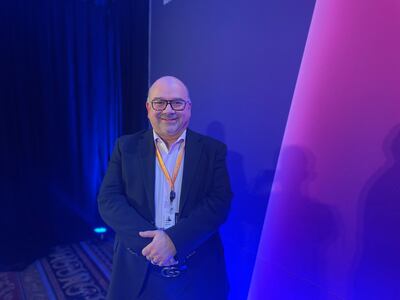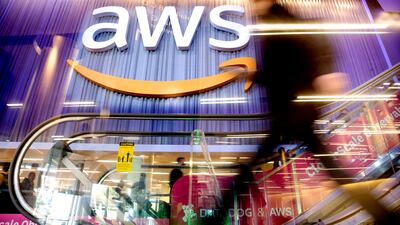The Internet of Things (IoT) industry is expected to grow significantly in the post-Covid era, driven by the fusion of generative artificial intelligence with IoT applications and technologies, according to the head of IoT at Amazon Web Services.
“IoT is still a young industry, but it is accelerating very fast. Earlier, it was just a choice, but the pandemic was an eye-opener and now it has become an absolute necessity for all businesses,” Yasser Alsaied, vice president and head of IoT at AWS, told The National.
“[The] pandemic was sudden … it imposed global lockdowns. Then who was monitoring or controlling the supply chains, factories, fires in forests, accidents, water pollution and the likelihood of another contagion? Unfortunately, nobody was around. Lessons learnt during the pandemic made remote sensing, remote controlling and remote management essential, and it is only possible through IoT.”
IoT is a collective network of connected devices that enables communication between computing systems through wired or wireless networks. This connectivity allows seamless digital monitoring or potential control of the physical environment.
“At AWS, we are building the fabric of IoT together, that includes cameras, sensors, chips, cloud services and risk mitigation.
“We have also merged it with generative AI that has added an extra layer of confidence and new use cases … IoT is the harvester of data and AI is helping to keep it secure, valid and make succinct predictions,” said Mr Alsaied.
This week, AWS unveiled its generative AI platform Amazon Q as a rival to Google-owned Bard and Microsoft-backed OpenAI in the fast-growing industry.
The new tool aims to enable businesses to streamline tasks and accelerate decision making and problem solving.
The potential value of IoT is growing. By 2030, consultancy McKinsey estimates the industry could be worth $12.5 trillion globally. This includes the value captured by consumers of IoT products and services.
The IoT market is projected to hit $2.06 trillion in 2028, from $1.02 trillion this year, growing at a compound annual growth rate of more than 15 per cent, according to research firm Mordor Intelligence.
AWS is focusing on three segments as part of its IoT initiative, which it says are fuelling the industry's growth: smart homes, automotive and industrial.
However, the IoT industry is complex and challenging, with businesses often tending to ignore its value, Mr Alsaied said.
“Any new technology or any new method of looking at things will have an impedance, especially in traditional environments like factories and buildings,” said Mr Alsaied, who joined the Seattle-based cloud services provider in 2021, after a 14-year stint at chip maker Qualcomm.
“Many enterprises do not link IoT with their profits and they tend to ignore it. But this perception is changing fast, especially when we have actual examples and case studies to prove the value and monetary gains.”
In a recent use case, a Coca-Cola factory in Turkey, one of the company’s biggest in the world, managed to save nearly 20 per cent on its bottom line by reducing waste in 12 months after using IoT solutions, Mr Alsaied said.
Another customer in Taiwan managed to save $30,000 in power bills in the first six months after implementing IoT solutions.
“That's a real money. So, besides reducing pollution, avoiding road accidents and predicting equipment maintenance, the cases that reflect actual savings have started to emerge. And they are helping us to win customers’ confidence,” Mr Alsaied said.
Founded in 2006, AWS is the world's biggest cloud services provider. It had good momentum in sales in the September quarter. Revenue reached $23.1 billion in the third quarter – rising annually by more than 12.2 per cent.
It has more than 240 services for various units such as compute, storage, databases, networking, analytics, machine learning, AI, IoT, security and augmented reality.
An average number of daily unique IoT devices connecting to the AWS service is 270 million.
“So, we have a unique 270 million devices working in parallel on any day … sending signals, messages, storing information at a massive scale from various sources such as cars, buildings, machines, factories and homes. To ensure data safety, we have implemented a multi-layer of encryption and security,” Mr Alsaied said.
“We also ensure we are delivering what our end customer wants, while following the data privacy regulations of different regions and governments.”
Profile of MoneyFellows
Founder: Ahmed Wadi
Launched: 2016
Employees: 76
Financing stage: Series A ($4 million)
Investors: Partech, Sawari Ventures, 500 Startups, Dubai Angel Investors, Phoenician Fund
Normal People
Sally Rooney, Faber & Faber
Trolls World Tour
Directed by: Walt Dohrn, David Smith
Starring: Anna Kendrick, Justin Timberlake
Rating: 4 stars
More from Neighbourhood Watch:
Company%20profile
%3Cp%3EName%3A%20Tabby%3Cbr%3EFounded%3A%20August%202019%3B%20platform%20went%20live%20in%20February%202020%3Cbr%3EFounder%2FCEO%3A%20Hosam%20Arab%2C%20co-founder%3A%20Daniil%20Barkalov%3Cbr%3EBased%3A%20Dubai%2C%20UAE%3Cbr%3ESector%3A%20Payments%3Cbr%3ESize%3A%2040-50%20employees%3Cbr%3EStage%3A%20Series%20A%3Cbr%3EInvestors%3A%20Arbor%20Ventures%2C%20Mubadala%20Capital%2C%20Wamda%20Capital%2C%20STV%2C%20Raed%20Ventures%2C%20Global%20Founders%20Capital%2C%20JIMCO%2C%20Global%20Ventures%2C%20Venture%20Souq%2C%20Outliers%20VC%2C%20MSA%20Capital%2C%20HOF%20and%20AB%20Accelerator.%3Cbr%3E%3C%2Fp%3E%0A
Gothia Cup 2025
4,872 matches
1,942 teams
116 pitches
76 nations
26 UAE teams
15 Lebanese teams
2 Kuwaiti teams
The specs: 2018 Renault Koleos
Price, base: From Dh77,900
Engine: 2.5L, in-line four-cylinder
Transmission: Continuously variable transmission
Power: 170hp @ 6,000rpm
Torque: 233Nm @ 4,000rpm
Fuel economy, combined: 8.3L / 100km
The more serious side of specialty coffee
While the taste of beans and freshness of roast is paramount to the specialty coffee scene, so is sustainability and workers’ rights.
The bulk of genuine specialty coffee companies aim to improve on these elements in every stage of production via direct relationships with farmers. For instance, Mokha 1450 on Al Wasl Road strives to work predominantly with women-owned and -operated coffee organisations, including female farmers in the Sabree mountains of Yemen.
Because, as the boutique’s owner, Garfield Kerr, points out: “women represent over 90 per cent of the coffee value chain, but are woefully underrepresented in less than 10 per cent of ownership and management throughout the global coffee industry.”
One of the UAE’s largest suppliers of green (meaning not-yet-roasted) beans, Raw Coffee, is a founding member of the Partnership of Gender Equity, which aims to empower female coffee farmers and harvesters.
Also, globally, many companies have found the perfect way to recycle old coffee grounds: they create the perfect fertile soil in which to grow mushrooms.
Schedule for Asia Cup
Sept 15: Bangladesh v Sri Lanka (Dubai)
Sept 16: Pakistan v Qualifier (Dubai)
Sept 17: Sri Lanka v Afghanistan (Abu Dhabi)
Sept 18: India v Qualifier (Dubai)
Sept 19: India v Pakistan (Dubai)
Sept 20: Bangladesh v Afghanistan (Abu Dhabi) Super Four
Sept 21: Group A Winner v Group B Runner-up (Dubai)
Sept 21: Group B Winner v Group A Runner-up (Abu Dhabi)
Sept 23: Group A Winner v Group A Runner-up (Dubai)
Sept 23: Group B Winner v Group B Runner-up (Abu Dhabi)
Sept 25: Group A Winner v Group B Winner (Dubai)
Sept 26: Group A Runner-up v Group B Runner-up (Abu Dhabi)
Sept 28: Final (Dubai)
BIGGEST CYBER SECURITY INCIDENTS IN RECENT TIMES
SolarWinds supply chain attack: Came to light in December 2020 but had taken root for several months, compromising major tech companies, governments and its entities
Microsoft Exchange server exploitation: March 2021; attackers used a vulnerability to steal emails
Kaseya attack: July 2021; ransomware hit perpetrated REvil, resulting in severe downtime for more than 1,000 companies
Log4j breach: December 2021; attackers exploited the Java-written code to inflitrate businesses and governments
The alternatives
• Founded in 2014, Telr is a payment aggregator and gateway with an office in Silicon Oasis. It’s e-commerce entry plan costs Dh349 monthly (plus VAT). QR codes direct customers to an online payment page and merchants can generate payments through messaging apps.
• Business Bay’s Pallapay claims 40,000-plus active merchants who can invoice customers and receive payment by card. Fees range from 1.99 per cent plus Dh1 per transaction depending on payment method and location, such as online or via UAE mobile.
• Tap started in May 2013 in Kuwait, allowing Middle East businesses to bill, accept, receive and make payments online “easier, faster and smoother” via goSell and goCollect. It supports more than 10,000 merchants. Monthly fees range from US$65-100, plus card charges of 2.75-3.75 per cent and Dh1.2 per sale.
• 2checkout’s “all-in-one payment gateway and merchant account” accepts payments in 200-plus markets for 2.4-3.9 per cent, plus a Dh1.2-Dh1.8 currency conversion charge. The US provider processes online shop and mobile transactions and has 17,000-plus active digital commerce users.
• PayPal is probably the best-known online goods payment method - usually used for eBay purchases - but can be used to receive funds, providing everyone’s signed up. Costs from 2.9 per cent plus Dh1.2 per transaction.




